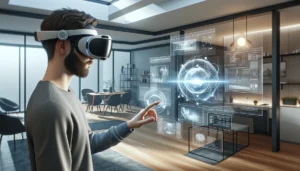At the heart of the technological revolution, Virtual Reality (VR) and Augmented Reality (AR) emerge as pioneering forces, redefining our interactions with the digital world. These technologies, once confined to the pages of science fiction, are now transforming industries, from entertainment and education to healthcare and retail.
Promising an era of unprecedented immersive experiences, this post explores the latest developments in VR and AR. We highlight their innovative applications in varied fields, from entertainment to education, and discuss the profound impact they are having on the digital transformation of various sectors.
What are VR and AR?
Virtual Reality transports us to completely simulated digital worlds, offering total immersion that can make us forget the physical reality that surrounds us. In contrast, Augmented Reality integrates digital elements into the real world, enriching our current perception without displacing us from it.
Recent Advancements in VR and AR:
The technology behind VR and AR has advanced rapidly, with significant improvements in hardware, such as lighter, more comfortable headsets, and software, which offer more realistic and immersive experiences. Leading companies are investing massively in research and development, seeking solutions to challenges like latency and motion sickness, while introducing new features like eye tracking and haptic feedback to increase the sense of presence.
Transformative VR and AR Applications:
- Education and Training: VR and AR are revolutionizing education and training by offering realistic, interactive simulations that can improve learning and retention. From VR surgery simulations for doctors to AR applications that overlay historical information on real locations for students, the possibilities are vast and varied.

- Entertainment: The entertainment sector was an early adopter of VR and AR, creating immersive gaming experiences and innovative digital art exhibitions. The technology is being used to create virtual concerts where fans can experience live performances from their favorite artists from anywhere in the world.
- Retail and Marketing: Brands are using AR to offer unique shopping experiences, allowing customers to view products in their real-world spaces before purchasing. Likewise, immersive VR marketing campaigns are creating deeper connections between consumers and brands.
- Health: VR is being employed to treat conditions such as PTSD, anxiety and phobias, offering controlled environments where patients can safely confront and work through their conditions. AR is helping surgeons better visualize areas of operation, improving surgical outcomes.
Challenges and Ethical Considerations:
Despite the enormous potential, VR and AR also bring challenges. Issues of privacy and data security are of great concern, especially as these technologies become more integrated into our everyday lives. Furthermore, there are ethical considerations related to the disorientation between the real and the virtual, and the impact that intensely realistic experiences can have on users' psychological well-being.
The Future of VR and AR:
Looking to the future, VR and AR are set to become even more integrated into our everyday lives. Advances in artificial intelligence and cloud computing are expected to further expand the capabilities of these technologies. Making them more accessible and providing even richer and more personalized experiences.
The convergence of VR and AR with other emerging technologies is creating new forms of digital interaction and collaboration. This innovative integration is reshaping the way we experience the world and how we connect with each other, bringing people together and opening doors to unprecedented educational and job opportunities.
Conclusion:
Virtual and Augmented Reality are on the threshold of fundamentally transforming our relationship with technology, offering paths to previously unimaginable experiences. As we explore these digital frontiers, we face challenges but also discover opportunities to enrich the human experience.
As we embrace these immersive technologies, we are not just witnessing a technological revolution; We are actively participating in creating a new world of infinite possibilities. This journey into the digital unknown promises not only to transform entire industries, but also to redefine our understanding of the real and the virtual.
